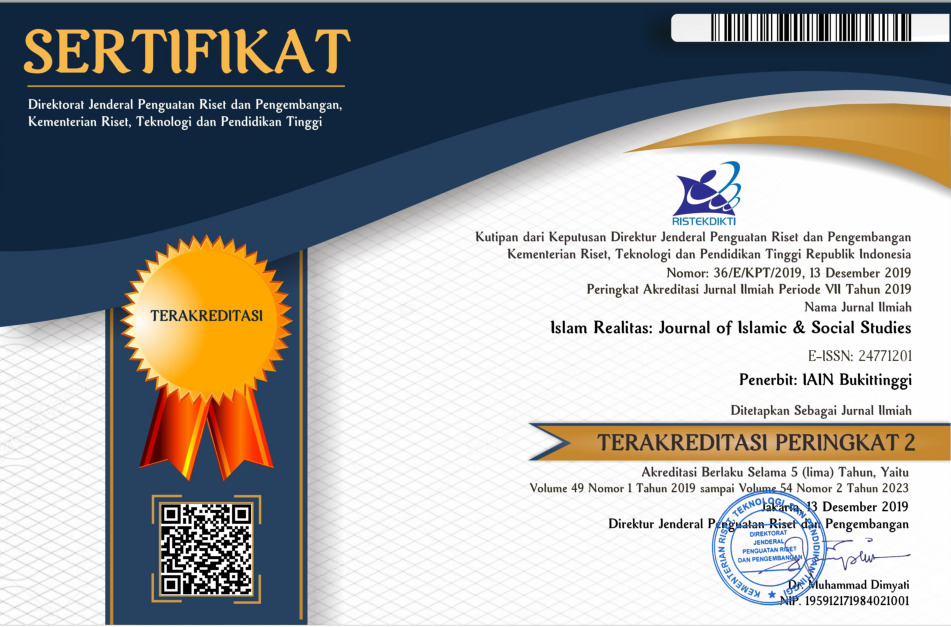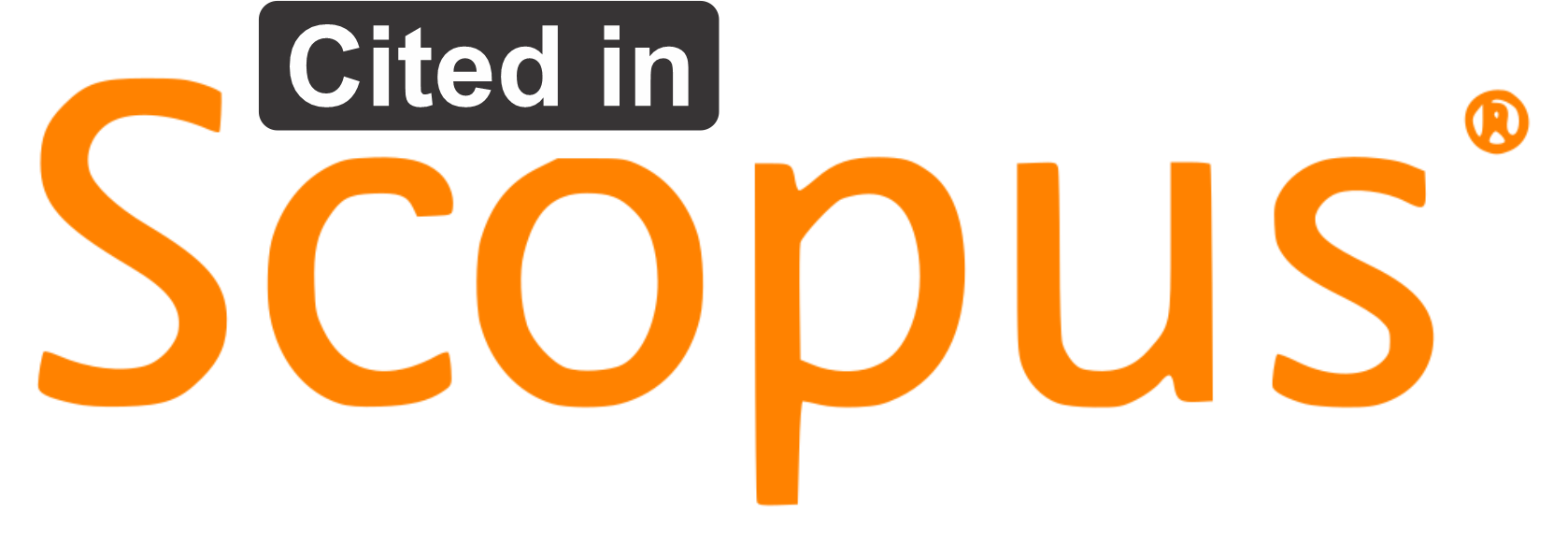Strengthening Islamic Environmental Awareness through Exploring Poetry as a Learning Resource in Social Studies
Downloads
Additional Files
This article aims to describe how an anthropocentric perspective can lead to an ethical solution to resolving the ecological crisis. The ecological crisis should be seen as a misrepresentation of the role of human beings in exceeding the limits of environmental exploitation as mandated in Islam. Therefore, education should be used in offering solutions and innovations in the various scholarly disciplines, such as social studies. One innovation is the use of poetry as a learning resource for social studies. Poetry exploration is devoted to utilizing the value of local poetry. A qualitative approach is used to describe a value-based social studies learning concept. This study focuses on the poem of Huma Yang Perih, which describes agricultural conditions in South Kalimantan that have begun to be abandoned by farmers. Even though the poem was published in 1978, this condition has persisted to this day. Through Huma Yang Perih, it is hoped that we can reflect on the importance of human continuity at all times, so that humanity no longer underestimate the changing lifestyles rural people and their migration to cities.
Â
Artikel ini bertujuan mendeskripsikan pandangan antroposentrisme sebagai cara etis untuk menuntaskan krisis ekologi. Krisis ekologi, patut dipandang sebagai bentuk kesalahan peran manusia dalam melampaui batas eskploitasi lingkungan sebagaimana diamanatkan dalam Islam. Oleh karena itu, diperlukan ruang edukasi sebagai satu solusi dan inovasi di bidang pembelajaran, seperti IPS. Satu inovasi yang dimaksudkan adalah pemanfaatan puisi sebagai sumber belajar IPS. Eksplorasi puisi dikhususkan dengan pemanfaatan nilai dari puisi lokal. Pendekatan kualitatif digunakan untuk mendeskripsikan makna yang relevan dengan konsep pembelajaran IPS berbasis nilai. Hasil penelitian menjelaskan puisi Huma Yang Perih yang menggambarkan kondisi pertanian di Kalimantan Selatan yang sudah mulai ditinggalkan petani. Meski puisi tersebut terbit tahun 1978, kondisi tersebut tetap bertahan hingga saat ini. Melalui Huma Yang Perih, diharapkan kita bisa merefleksikan betapa pentingnya kesinambungan manusia setiap saat. Sehingga masyarakat tidak lagi menganggap remeh untuk mengubah gaya hidup pedesaan dan bermigrasi ke perkotaan
Books
Abdillah, Mujiyono, Agama Ramah Lingkungan: Perspektif Al-Qur’an (Jakarta: Paramadina, 2001)
Al-Mubarakfuri, Shafiyyurrahman, Shahih Tafsir Ibnu Katsir (Jakarta: Pustaka Ibnu Katsir, 2007)
Almuchtar, Suwarma, Strategi Pembelajaran Pendidikan IPS (Bandung: Gelar Pustaka Mandiri, 2008)
Anies, Manajemen Berbasis Lingkungan: Solusi Mencegah dan Menanggulangi Penyakit Menular (Jakarta: Elek Media Komputindo, 2006)
Barr, R.D., Barth, J.L., & Shermis, S.S, The Nature of the Social Studies (Palm Spiring: An ETS Pablictions, 1978)
Charmaz, Kathy, Constructing Grounded Theory (Introducing Qualitative Methods Series) (London: Sage Publication Ltd, 2014)
Daud, Alfani, Islam dan Masyarakat Banjar: Deskripsi dan Analisa Kebudayaan Banjar (Jakarta: Raja Grafindo Persada, 1997)
Day, T., ‘In Praise of Slow Learning in Literary Studies’, in International Perspectives on the Teaching of Literature in Schools: Global Principles and Practices, ed. by Andrew Goodwyn, Cal Durrant, Louann Reid, and Lisa Scherff (London: Routledge, 2017)
Khan, Richard, Critical Pedagogy, Ecoliteracy, dan Planetary Crisis: The Ecopedagogy Movement (New York: Peter Lang, 2010)
Muhaimin, Pengembangan Model Problem Based Learning dalam Ecopedagogy untuk Peningkatkan Kompetensi Ekologis Mata Pelajaran IPS (Bandung: Universitas Pendidikan Indonesia, 2014)
NCSS, Curriculum Standards for Social Studies: Expectation of Excellence (Washington DC: NCSS, 1994)
Palmer, Joy A, Environmental Education In The 21st Century: Theory, Practice, Progress, and Promise (London and New York: Routledge, 1998)
Parker, C. Walter, Social StudiesToday; Research and Practice (New York: Routledge, 2010)
Pradopo, Rachmat Djoko, Beberapa Teori Sastra, Metode Kritik, dan Penerapannya (Yogyakarta: Pustaka Pelajar, 2009)
Pradopo, Rahmat Djoko, Beberapa Teori Sastra, Metode Kritik, dan Penerapannya (Jakarta: Pustaka Pelajar, 2012)
Ranjabar, Jacobus, Sistem Sosial Budaya Indonesia Suatu Pengantar (Bandung: Ghalia Indonesia, 2006)
Sanjaya, Wina, Strategi Pembelajaran Berorientasi Standar Proses Pendidikan (Jakarta: Prenada Media, 2006)
Sapriya, Pendidikan IPS: Konsep dan Pembelajaran (Bandung: Remaja Rosdakarya, 2012)
Soemarwoto, Otto, Ekologi Lingkungan Hidup dan Pembangunan (Jakarta: Djambatan, 2008)
Soerjani, Moh, Kesehatan Lingkungan (Jakarta: Universitas Indonesia, 2008)
Sumaatmaja, Nursid, Pembelajaran IPS (Jakarta: Departemen Pendidikan, 1980)
Supardan, Dadang, Pendidikan IPS: Persfektif Filosofi, Kurikulum, dan Pembelajaran (Bandung: Universitas Pendidikan Indonesia, 2014)
Swan, J.A, Stapp, W. P., Environmental Education; Strategy toward a More Livable Future (New York: John Wiley & Sons So, 1974)
Taylor, Bryan C, and Nick Trujillo, ‘Qualitative Research Methods’, in The New Handbook of Organizational Communication: Advances in Theory, Research, and Methods, 2001, pp. 161–94
Trilling, Bernie dan Fadel Charles, 21st Century Skills; Learning For Life in Our Times (United States of America: Jossey-Bass, 2009)
Xin, Qi, ‘From “Modernism†to “Post-Modernismâ€â€”Fission of Literature, Arts and Society’, in A Brief History of Human Culture in the 20th Century, 2019, pp. 209–33 <https://doi.org/10.1007/978-981-13-9973-2_10>
Yus, Rusyana, Bahasa Dan Sastra Dalam Gamitan Pendidikan (Bandung: CV. Diponegoro, 1984)
Conference Proceedings
Day, T., ‘In Praise of Slow Learning in Literary Studies’, in International Perspectives on the Teaching of Literature in Schools: Global Principles and Practices, ed. by Andrew Goodwyn, Cal Durrant, Louann Reid, and Lisa Scherff (London: Routledge, 2017), pp. 125–32 <https://doi.org/10.4324/9781315396460>
Taylor, Bryan C, and Nick Trujillo, ‘Qualitative Research Methods’, in The New Handbook of Organizational Communication: Advances in Theory, Research, and Methods, 2001, pp. 161–94
Zuriyati, ‘Metaphors in Mutanabbi’s Poetry as a Description of the Ecological Community of the Arabic (A Literary Ecology Study)’, ICELS: International Conference on Education, Language, and Society, 2020, 545–50 <https://doi.org/10.5220/0009003105450550>
Journals
Bouley, T., ‘The Sky Is Falling: An Examination of Ways to Heighten Young Children Awareness Of Environmental Issues That Result in Increased Feelings of Self-Efficacy Rather than Disempowerment and Fear’, New England Journal of Environmental Education, 2009, 1–7
Clark, G., ‘History and Ecology The Poetry of Les Murray and Gary Snyder’, Interdisciplinary Studies in Literature and Environment, 10.1 (2003), 27–53 <https://doi.org/10.1093/isle/10.1.27>
Costanza et. al., ‘Sustainability or Collapse: What Can We Learn from Integrating the History of Humans and The Rest of Nature’, Swedia: Journal Ambio, 36.7 (2007)
Domanska, E, ‘Beyond Anthropocentrism in Historical Studies’, Journal Historein, 10 (2010)
Dowling, Robyn, Kate Lloyd, and Sandie Suchet-Pearson, ‘Qualitative Methods 1: Enriching the Interview’, Progress in Human Geography, 40.5 (2016), 679–86 <https://doi.org/10.1177/0309132515596880>
Greenhow, Christine, and Beth Robelia, ‘Old Communication, New Literacies: Social Network Sites as Social Learning Resources’, Journal of Computer-Mediated Communication, 14.4 (2009), 1130–61 <https://doi.org/10.1111/j.1083-6101.2009.01484.x>
Grewing, Farouk F., ‘A Saturnalian Poet as a Literary Critic’, Thersites: Journal for Transcultural Presences & Diachronic Identities from Antiquity Ti Date, 11 (2020), 176–204
Kasayanond, Arunee, Rofiqul Umam, and Kittisak Jermsittiparsert, ‘Environmental Sustainability and Its Growth in Malaysia by Elaborating the Green Economy and Environmental Efficienc’, International Journal of Energy Economics and Policy, 9.5 (2019), 465–73 <https://doi.org/10.32479/ijeep.8310>
Khan, Tariq, and Inayat Ullah, ‘Islam and Mysticism : An Analysis of the Sufi Symbolism in the Select Poetry of Omer Tarin’, Al-Azhaar, 5.1 (2019), 1–13
Mercado, N., ‘Epologue for the 21st Century’, Black Renaissance, 19.1 (2019), 74–181
Mutiani, M., ‘IPS dan Pendidikan Lingkungan: Urgensi Pengembangan Sikap Kesadaran Lingkungan Peserta Didik’, Sosio-Didaktika: Social Science Education Journal, 4.1 (2017), 45–53
Neale, Joanne, Debby Allen, and Lindsey Coombes, ‘Qualitative Research Methods within the Addictions’, Addiction, 100.11 (2005), 1584–93 <https://doi.org/10.1111/j.1360-0443.2005.01230.x>
Noor, Irfan, ‘Ulama dan Masyarakat Banjar’, Jurnal Kebudayaan Kandil 2, 1 (2003), 18–25
Sandelowski, Margarete, ‘Focus on Qualitative Methods. The Use of Quotes in Qualitative Research’, Research in Nursing & Health, 17.6 (1994), 479–82 <https://doi.org/10.1002/nur.4770170611>
Seaman, Carolyn, ‘Qualitative Methods’, in Guide to Advanced Empirical Software Engineering, 2008, pp. 35–62 <https://doi.org/10.1007/978-1-84800-044-5_2>
Spicer, Kevin Andrew, and Beth Mcdermott, ‘Poeticizing Ecology / Ecologizing Poetry : Reading Emily Bishop ‘ s “ Poem “ Ecologically’, The Trumpeter: Journal of Ecosophy, 33.1 (2017), 48–68
Steckler, Allan, Kenneth R. Mcleroy, Robert M. Goodman, Sheryl T. Bird, and Lauri Mccormick, ‘Toward Integrating Qualitative and Quantitative Methods: An Introduction’, Health Education & Behavior, 19.1 (1992), 1–8 <https://doi.org/10.1177/109019819201900101>
Subiyakto, Bambang, and Mutiani, ‘Internalisasi Nilai Pendidikan Melalui Aktivitas Masyarakat Sebagai Sumber Belajar Ilmu Pengetahuan Sosial’, Khazanah: Jurnal Studi Islam Dan Humaniora, 17.1 (2019), 137–66 <https://doi.org/10.18592/khazanah.v17i1.2885>
Ulucan, Özlem, ‘MİLLİŞai̇r OlaraBi̇li̇nen MehmetAki̇f Ersoy’Un SeçmeEserleriMi̇lli̇yetçi̇li̇ği̇Yeni̇den Düşünmek’, Turkish Studies - Language and Literature, 14.2 (2019), 941–54 <https://doi.org/10.29228/turkishstudies.22858>
Woodward, Mark, ‘Islam Nusantara: A Semantic And Symbolic Analysis’, Heritage of Nusantara: International Journal of Religious Literature and Heritage, 6.2 (2017), 181–98
Xin, Qi, ‘From “Modernism†to “Post-Modernismâ€â€”Fission of Literature, Arts and Society’, in A Brief History of Human Culture in the 20th Century, 2019, pp. 209–33 <https://doi.org/10.1007/978-981-13-9973-2_10>
Authors who publish with this journal agree to the following terms:
- Authors retain copyright and grant the journal right of first publication with the work simultaneously licensed under a Creative Commons Attribution License that allows others to share the work with an acknowledgment of the work's authorship and initial publication in this journal.
- Authors are able to enter into separate, additional contractual arrangements for the non-exclusive distribution of the journal's published version of the work (e.g., post it to an institutional repository or publish it in a book), with an acknowledgment of its initial publication in this journal.
- Authors are permitted and encouraged to post their work online (e.g., in institutional repositories or on their website) prior to and during the submission process, as it can lead to productive exchanges, as well as earlier and greater citation of published work (See The Effect of Open Access).









